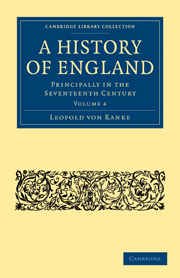Book contents
- Frontmatter
- Contents
- BOOK XVI THE LATER YEARS OF CHARLES II, 1675—1685 WHIGS AND TORIES
- BOOK XVII REIGN OF JAMES II, FEBRUARY 1685 TO SEPTEMBER 1688
- BOOK XVIII THE FALL OF JAMES II IN ITS CONNEXION WITH THE EUROPEAN CONFLICTS WHICH MARKED THE CLOSE OF 1688
- BOOK XIX COMPLETION OF THE REVOLUTION IN THE THREE KINGDOMS, 1688—1691
- INTRODUCTION
- CHAP. I William of Orange in London. Summoning of a Convention
- CHAP. II First sittings of the Convention. Debates on the vacancy of the Throne
- CHAP. III Elevation of the Prince of Orange to the English Throne. Constitutional limitations of the power of the Crown
- CHAP. IV James II in Ireland supported by help from France
- CHAP. V Dundee in the Scottish Highlands
- CHAP. VI Military events in Ireland in the year 1689
- CHAP. VII Dissensions in the Convention Parliament
- CHAP. VIII Dissolution of the Convention Parliament. First sittings of the Parliament of 1690
- CHAP. IX The Court at Dublin. Rivalry of the French and English Navies
CHAP. VII - Dissensions in the Convention Parliament
Published online by Cambridge University Press: 07 September 2011
- Frontmatter
- Contents
- BOOK XVI THE LATER YEARS OF CHARLES II, 1675—1685 WHIGS AND TORIES
- BOOK XVII REIGN OF JAMES II, FEBRUARY 1685 TO SEPTEMBER 1688
- BOOK XVIII THE FALL OF JAMES II IN ITS CONNEXION WITH THE EUROPEAN CONFLICTS WHICH MARKED THE CLOSE OF 1688
- BOOK XIX COMPLETION OF THE REVOLUTION IN THE THREE KINGDOMS, 1688—1691
- INTRODUCTION
- CHAP. I William of Orange in London. Summoning of a Convention
- CHAP. II First sittings of the Convention. Debates on the vacancy of the Throne
- CHAP. III Elevation of the Prince of Orange to the English Throne. Constitutional limitations of the power of the Crown
- CHAP. IV James II in Ireland supported by help from France
- CHAP. V Dundee in the Scottish Highlands
- CHAP. VI Military events in Ireland in the year 1689
- CHAP. VII Dissensions in the Convention Parliament
- CHAP. VIII Dissolution of the Convention Parliament. First sittings of the Parliament of 1690
- CHAP. IX The Court at Dublin. Rivalry of the French and English Navies
Summary
William III had formed his court and ministry principally from among those men who had been serviceable to him in the acquisition of the crown, as though it had been his object to let them share in the enjoyment of the power which had been acquired with their co-operation. So, too, did they seem to understand the privileges of office. Mordaunt and Delamere, for example, to whom the principal offices in the Treasury fell, made use of them in order to admit their friends and those who shared their sentiments into the subordinate posts; Delamere not without stipulating for advantages for himself in the process; Mordaunt preferred men of the extreme Whig or even republican shade of opinion to all others. Neither of them had any knowledge of their business nor any fitness for it. How should Mordaunt, who never knew how to keep a hundred pounds together, administer the finances of a great kingdom? The management of them fell into the hands of a third man, who had also claims on the King's gratitude, the versatile and gifted Godolphin, who was acquainted with this very department and qualified for it; it only caused some surprise that Mordaunt and Delamere were zealous Whigs, while Godolphin then belonged to the Tory party. But such was the system of the moment throughout. Thus the two Secretaryships of State, no doubt the most important of the offices of that time, had been assigned one to a Whig and the other to a Tory, and indeed even to men who might be considered as the heads of their parties.
- Type
- Chapter
- Information
- A History of EnglandPrincipally in the Seventeenth Century, pp. 565 - 578Publisher: Cambridge University PressPrint publication year: 2010First published in: 1875



